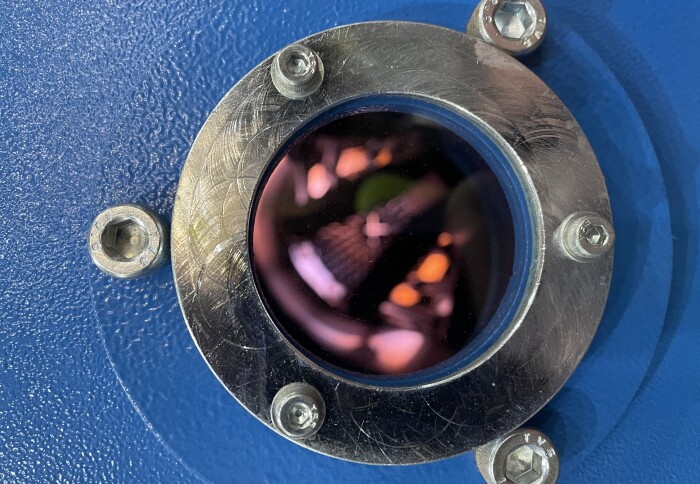De-steaming project nears completion
by Jan Carberry

The boiler ignition flames seen trhough the viewing porthole
One of three new permanent boilers has been successfully integrated into the district heat network on South Kensington Campus.
It's an exciting stage in the de-steaming project, part of the bigger net zero campus ambition, bringing it tantalisingly close to completion and something for the whole of Imperial to celebrate.
The smallest of the three boilers installed in the energy centre was recently commissioned, (Thursday 11 April) bringing 10-megawatt capacity into the system, clearing the way to switch off two temporary boiler sites the campus was reliant on over the winter.
Visible signs of this progress will be these compounds near the Abdus Salam Library and Skempton buildings being returned to normal use as the temporary boilers, flues, scaffolding and fuel tanks are decommissioned and cleared over the next few weeks.
Alongside this work the two 12-megawatt boilers are soon to be commissioned. Once tested and once their capacity is integrated into the new system, the other temporary boiler sites around Blackett and ACE will be cleared.
We are also at the point where all steam has been removed from the buildings, with two exceptions.
It remains in Sir Alexander Fleming building in CBS where it is required to run equipment. In ACE, where steam is needed for experiments, steam is supplied by a separate electrical system.
Background
It’s been a huge and complicated project, not without hitches.
In 2022 the College was awarded a Public Sector Decarbonisation Scheme grant of more than £12m which contributed towards the £40m cost of this project, expected to reduce Imperial’s CO2 emissions by more than 2,400 tonnes per annum.
For several decades heating and hot water for the buildings on South Kensington Campus came from two district heat networks, a heated water network and a steam network. Neither had enough heating capacity to replace the other. Having two heat networks is inherently wasteful and inefficient. With only relatively small demands for steam this could be replaced with heated water, making it possible to remove the steam and condensate heat networks.
The new boilers are much more efficient that the old ones increasing from 79% to 87% efficiency, 8% more efficient than the old ones in converting natural gas to useful heat. It might not sound much but it has a significant impact. They also ‘extract’ more of the waste heat from the CHP engines thus making the system significantly more efficient than previously.
Article text (excluding photos or graphics) © Imperial College London.
Photos and graphics subject to third party copyright used with permission or © Imperial College London.
Reporter
Jan Carberry
Estates Division